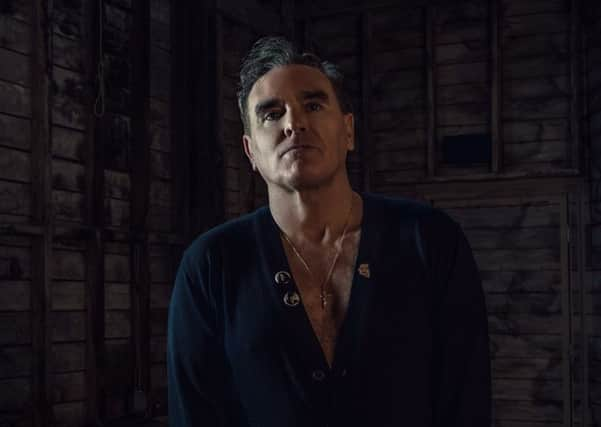Album reviews: Morrissey | Mavis Staples | Honeyblood | Erland Cooper


Morrissey: California Sun (Etienne Records/BMG) ***
Mavis Staples: We Get By (Anti” ****
Honeyblood: In Plain Sight (Marathon Artists) ****
Erland Cooper: Sule Skerry (Phases) ***
Given Morrissey’s wry broadside at protest singers on the rollicking Smiths track Shakespeare’s Sister (“I can smile about it now but at the time it was terrible”), it is something of a surprise to find him tackling the big beasts of 60s counterculture on his first ever collection of cover versions.
Following his recent right wing endorsements, there is an additional degree of reckoning with his version of Bob Dylan’s Only A Pawn in Their Game, which argues that there was more than one victim in the shooting of civil rights activist Medgar Evans, though its portrait of an underclass does chime with Morrissey’s disdain for authority.
Advertisement
Hide AdAdvertisement
Hide AdHe makes further eloquent connoisseur choices on California Sun, successfully riding the ebb and flow of a Joni Mitchell melody, while navigating soft rock sax on Don’t Interrupt the Sorrow and pointedly mining the current resonance of Phil Ochs’ 1965 rallying cry Days of Decision (“you can’t stand around when the ice is growing thin”).
But he is generally more comfortable having fun with the suggestive Morning Starship by cult queer artist Jobriath, the grand melodrama of Roy Orbison’s It’s Over, the sledgehammer seduction of Gary Puckett’s Lady Willpower and the frustrated romantic aspirations of Laura Nyro’s Wedding Bell Blues, with blithe backing vocals from Green Day’s Billie Joe Armstrong.
The emotional devastation of Bacharach & David’s Loneliness Remembers What Happiness Forgets is undercut by the cheesy easy listening rendition but he digs deeper with Tim Hardin’s poignant piano ballad Lenny’s Tune and the flamenco flourish of Melanie’s Some Say I Got Devil.
His taste in selections is so impeccable that he cannot better the originals – nor does it sound like he is trying to – but just as he once turned a generation on to the works of Oscar Wilde, Joe Orton and the New York Dolls, Morrissey again proves to be an adroit gatekeeper.
In crazy times, we need the grace and sagacity of Mavis Staples, still dispensing healing balm as she approaches her 80th birthday. Following her fertile collaborations with Wilco’s Jeff Tweedy, she hooks up with singer/guitarist Ben Harper on her latest album, which mines their shared bluesy leanings.
Despite his own stellar six-string abilities, Harper wisely shows restraint across We Get By, complementing rather than competing with the controlled authority of Staples’ tough but tender delivery.
Highlights of this utterly self-possessed collection include the slinky conscious soul of Brothers and Sisters, the sublime ache of Never Needed Anyone and southern-fried Chance On Me, but every track is an intimation of a better world.
Advertisement
Hide AdAdvertisement
Hide AdTo lose one drummer is unfortunate; losing a second looks like carelessness – but a solo Stina Tweedale continues her consistent run of superior indie pop missives on the third Honeyblood album. In Plain Sight is no great leap forward, just another dynamic batch of innately catchy songs which straddle the pop/rock ravine with the ease and attitude of her grrrl band forebears from The Go-Go’s to The Breeders.
There’s also a side order of Suzi Quatro in the fuzz glam stomp of A Kiss from the Devil, with Tweedale gliding fluently from demure to demonic, and further satisfying switches between the incandescent jabber of Gibberish and brooding, bubbling electro rock of Touch.
Sule Skerry is the second album in a trilogy which celebrates Erland Cooper’s native Orkney islands, this one channelling the hypnotic pull of the North Sea and local legends of the shape-shifting Selkie. Soprano Lottie Greenhow supplies the requisite otherworldly siren presence over Cooper’s minimalist piano patterns and sighing string trio on Spoot Ebb, while elsewhere this soothing suite is embellished by Leo Abrahams’ beatific guitar, Cooper’s field recordings of local folks and the (speaking) voices of Kathryn Joseph and fellow Orcadian Kris Drever. - Fiona Shepherd
CLASSICAL
Jerusalem Quartet: The Yiddish Cabaret (Harmonia Mundi) ****
The Yiddish Cabaret finds the excellent Jerusalem Quartet, with soprano Hula Baggio, exploring a musical and spiritual world close to their hearts. There are two fascinating string quartets by early 20th century Jewish composers Erich Korngold and Erwin Schulhoff; the latter perished in a concentration camp in 1942, the former found safety in early Hollywood. Korngold’s Second Quartet is a cocktail of Straussian late-Romanticism, flecked with expressionist tendencies, but softened through the Intermezzo and the lilt of the waltz Finale. Schulhoff’s Five Pieces are both charming and disarming. Angry dissonance vies with neoclassical dance, sultry primitivism with sophisticated rhythmic complexity. The disc ends with a contemporary arrangement by Leonid Desyatnikov of Five Yiddish Songs, conjuring up the earthiness of Warsaw Jewish street life and the cabaret style of the interwar period. - Ken Walton
FOLK
Lizabett Russo: Something-in-movement (Lizabettrusso.com) ****
As things intensify in the opening Ocean Frequency, you enter the weird and wonderful sound world of Lizabett Russo. This Scottish-based Romanian singer-songwriter is a vocalist of extraordinary range, her voice soaring and quavering with nervy urgency, and she couldn’t be better matched on this third album by a potent grouping of electric guitar wizard Graeme Stephen, violinist Tim Vincent-Smith, cellist Pete Harvey and Tim Lane on percussion.Her songs are by turns invocative, accusatory and plaintive. Superficial comparisons to Kate Bush are perhaps inevitable, as in Birds, where her voice hovers and swoops against gentle guitar and cello, but Russo is a one-off. Darkly dramatic strings transcend the slightly faux-folk fol-de-rols of Penumbra and there’s a rocked up Eastern European vibe to The Hunter and the Prey. It ends with the charm of the Danube Song, which her grandfather used to sing. - Jim Gilchrist